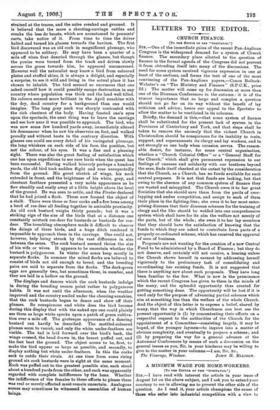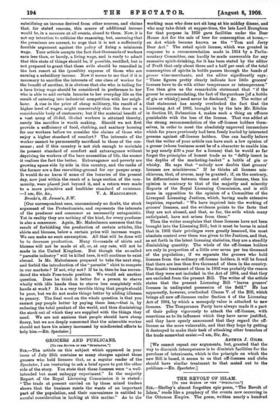A MINIMUM WAGE FOR HOME-WORKERS.
[To THB EDITOR 0? TUB "SPECTATOR." J SIR,—I have read with interest the article in your issue of August 1st on the above subject, and I ask you to extend your courtesy to me in allowing me to present the other side of the question. As I read it, your article champions the cause of those who enter into industrial competition with a view to
subsidising an income derived from other sources, and claims that, for stated reasons, this source of additional income would be, in a measure at all events, closed to them. Now, it is not my intention to criticise the reasoning, but, assuming that the premisses are correct, to urge that it is not a sufficiently forcible argument against the policy of fixing a minimum wage. Your article accepts the fact that thousands of workers earn less than, or barely, a living wage, and is ready to admit that this state of things should be, if possible, rectified, but is not prepared to grant that these evils should be remedied in the last resort at the (possible) expense of those who are earning a subsidiary income. Now it seems to me that if it is necessary to sacrifice the interests of one class of worker for the benefit of another, it is obvious that she who is toiling for a bare living wage should be considered in preference to her who is able to add certain luxuries to her everyday life as the result of entering into industrial competition with her neigh- bour. A rise in the price of cheap millinery, the result of a higher level of wages, might conceivably shut the door on a considerable body of customers; but if the material benefit of a vast army of ill-fed, ill-clad workers is attained thereby, surely the sacrifice is worth making. Should we not first provide a sufficiency of food, clothing, and sanitary housing for our workers before we consider the claims of those who enjoy a, higher standard of comfort ? The interests of the worker cannot be permanently sacrificed to those of the con- earner ; and if this country is not rich enough to maintain its present standard of comfort and extravagance without depriving its workers of the bare necessities of life, the sooner it realises the fact the better. Extravagance and poverty are growing apace side by side in this country, and the ranks of the former are a fine recruiting-ground for our pauper army. It would do no harm if some of the luxuries of the present day, now just within the reach of a large section of the com- munity, were placed just beyond it, and a return were made to a more primitive and healthier standard of existence.
[Our correspondent uses, unconsciously no doubt, the stock argument of the Protectionists, and represents the interests of the producer and consumer as necessarily antagonistic. Yet in reality they are nothing of the kind, for every producer is also a consumer. Again, Mr. Malcolmson assumes that the result of forbidding the production of certain articles, like shirts and blouses, below a certain price will increase wages. We can make no such assumption. All that will be done will be to decrease production. Many thousands of shirts and blouses will not be made at all, or, at any rate, will not be made in the United Kingdom. But though the so-called "parasite industry" will be killed here, it will continue to exist abroad. Is Mr. Malcolmson prepared to take the next step, and forbid the introduction of the" parasite" shirt to compete in our markets ? If not, why not ? If he is, then he has surren- dered the whole Free-trade position. We would ask another question. Does he think it better for a person to starve wholly with idle hands than to starve less completely with hands at work ? It is a very terrible thing that people should be poor, but we do not make things better by adding idleness to penury. The final word on the whole question is that you cannot pay people better by paying them less,'—that is, by reducing the total product of the world, and thus diminishing the stock out of which they are supplied with the things they need. We are not anxious that people should have cheap finery, but we are deeply concerned that the miserable worker should not have his misery increased by misdirected efforts to help him.—ED. Spectator.]



































 Previous page
Previous page